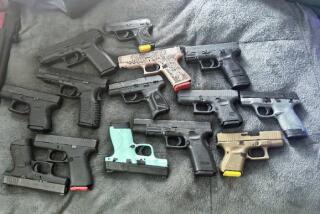COUNTYWIDE : Police Differ on Sale of Confiscated Guns
- Share via
Locked in Police Department storage rooms throughout Orange County are thousands of confiscated guns. Like the prisoners in a jail cell, the weapons come in different shapes and sizes, each with its own past.
Each gun’s future, however, depends on where it was picked up.
In some cities, most confiscated guns are destined to be melted or pummeled into unrecognizable heaps of steel by law enforcement officials who believe that all guns involved in crimes should be destroyed.
But other police departments opt to resell or trade confiscated weapons in exchange for money, new police firearms or spare parts.
The approaches might seem at opposite ends, but police chiefs on either side of the issue insist that they have the best interests of their citizens at heart.
Gun-destroying proponents say they feel duty-bound to get rid of all confiscated weapons lest they be used again to harm innocent people.
Gun-selling advocates, on the other hand, say that residents are better served if revenues from the guns are used to improve their police departments at no expense to taxpayers.
Police departments in Anaheim, Buena Park, Westminster, Tustin, San Clemente, Brea and Irvine are among those that destroy most confiscated weapons.
Departments in Fullerton, La Habra, La Palma, Placentia, Santa Ana and Costa Mesa are among those where officials sell at least some of their confiscated weapons to gun dealers.
For them, the issue is less about ethics than about money.
“This is an obvious revenue source for us,” said Costa Mesa Police Chief David L. Snowden. “The city needs money right now and this is a way of adding revenues.”
The amount of money collected for the guns varies from department to department. A small city such as La Habra collected about $5,000 last year while Santa Ana police received $54,000 for the 832 guns auctioned off in fiscal year 1991-92.
Officials emphasized that guns are sold to registered gun dealers or auctioneers only, making it unlikely that the weapons will find their way back into criminals’ hands. Since most dealers are located hundreds of miles away from Orange County, officials said they doubted the guns will ever return to the area.
Authorities also emphasized that they carefully follow state guidelines on reselling weapons and screen each gun before deciding what to do with it. High-powered weapons and cheap guns favored by criminals are rarely resold, they said.
“People can buy guns. The gun companies would love us to destroy all our guns because then they could sell all new ones,” Snowden said. “If I thought these guns were being placed in the hands of criminals, I wouldn’t do it.”
Other police officials agree with Snowden, though a few were less enthusiastic about the sales. “If money wasn’t so tight, we might just have the guns crushed,” said Darrin Kossky, property officer for the Placentia Police Department. “I’m not sure what the sense is in putting the guns back on the street.”
That’s exactly the point, say officials at departments that destroy guns. They claim that no matter where the guns are resold, they still pose a risk to the public.
“How would you feel if you rolled up to a shooting and found out that the gun you sold last year killed one person or a group of people?” Anaheim Police Chief Joseph T. Molloy said. “I don’t think it is my responsibility to provide gun dealers with guns.”
The way Molloy and his allies see it, there are already too many guns on the streets and too many ways to get them. Once a weapon reaches police hands, they contend, law enforcement should do whatever it can to make sure the gun is not used again in a crime.
“I think we have a responsibility to make our community safe,” Molloy said. “I don’t think selling weapons that were used in crimes to gun dealers makes the community safer.”
Molloy also questioned how much authorities profit from the sales.
“I don’t know how much money would be generated if we sold weapons,” he said. “Would it be worth it? I think the price is too high if it means heartache, grief and disruption for the community.”
More to Read
Sign up for Essential California
The most important California stories and recommendations in your inbox every morning.
You may occasionally receive promotional content from the Los Angeles Times.











